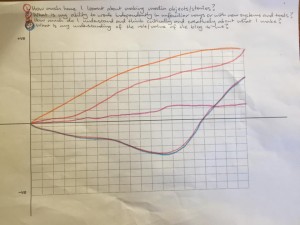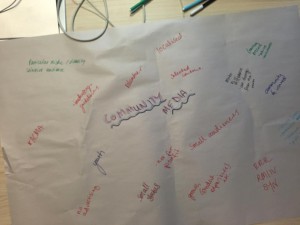I really feel like I’ve learnt a lot this semester. Although at times some tasks and lectures felt mundane and irrelevant, as I reflect upon the semester and all that I’ve learnt and all I have achieved, I realise that I’ve actually learnt heaps. With that, I feel like I’ve opened my mind to more than just filmmaking and script-writing and I’m really keen to develop my skill set. I think being surrounded by people who want to work in the same industry as myself really inspired me to learn more and to be a better filmmaker and create better and diverse media products.
I find that I work well when things are discussed and planned. I like the idea of building off other peoples opinions and ideas. I think that critiquing and analysing the technical elements of my own work and the work of my peers was very beneficial to me. First of all, because I caught a glimpse at the standard my work had to live up to so that I didn’t fall behind as others progressed. Secondly, because I could see the strengths and weaknesses of my peers and I could see who could help me on developing my own. And thirdly, because my own work was given the opportunity to be critiqued by others . I believe this is the most important part of the learning experience, or at least it is for me. I always take on board the opinion of others when it comes to something I’ve created and I choose to better my work upon their opinions. I can’t think of any better way to become better at what I do.
I think what I’ve learnt, and what this course so far has pushed me to do, is to be more creative and more textured with my work. Although I’m still trying to understand how to be more textured with my work, I think I’ve been forced to get out of my comfort zone and explore a wider range of skills and to incorporate different forms of media into my work. I think that this course keeps reminding me that there’s not just one form of media, but that it surrounds us in many different ways – something I know but I easily ignore.
Throughout the semester, I didn’t take the course too seriously and was more keen to be a part of university life and expanding my social life. This resulted in work that I can’t say lived up to my abilities. In saying that, however, as the semester progressed, I did find that I picked myself up and got my head in the game and started critically thinking and creating work that I could say I was proud of. Hopefully next semester I can be more focussed and prepared from the get go so that I can create more things that I’m proud to present.
As a filmmaker, I was forced to face with my own weaknesses during this course. Looking at other peoples work and comparing it to my own made me critically think about my own abilities. I realised how uncomfortable I am using music or sound in my films. I’m more of a visual person and I often forget or leave the audio aspect of my films to the last minute so that it gets neglected or I give up on it. This is something that I want to work on so that I can turn a weakness into a strength and develop further.
It’s been a good semester. Cheers Media One, it’s been a good run. Let’s crack open semester two
xx

